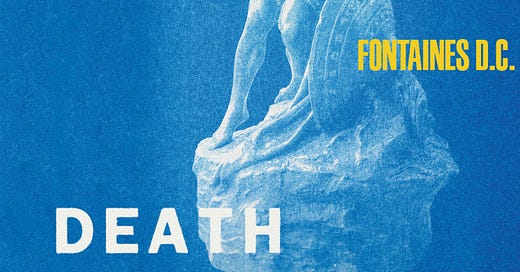A Hero’s Death by Fontaines D.C. | Album Review
The sophomore record from the Irish post-punk quintet displays a dislike of being tethered to one style of music.
The British Isles have recently found themselves the center of a new wave in rock music, a revival of the post-punk genre that initially broke through in the early 1980s.
Bands like Black Country, New Road, Black Midi, The Murder Capital, and more have taken the European rock scene by storm with their unorthodox instrumentation, improvisational performance styles, and lyrics that range from scathing to heartbreaking.
Hailing from the Emerald Isle, Fontaines D.C. fought their way to the top of the post-punk genre with their 2019 debut Dogrel. That album’s raw energy and pointedly cerebral lyrics earned it universal acclaim and nominations for the 2019 Mercury Prize and Choice Music Prize.
But despite this early work's success, the Irish quintet was not content to continue down the same musical path. Just a year later, they released their sophomore record, A Hero’s Death, which saw the band significantly deviate in style.
Instead of the punchy and punk-inspired style of Dogrel, A Hero’s Death takes influence from groups like Suicide, Beach House, and The Beach Boys to create a more low-key album with longer songs, vocal harmonies, and electronic elements. I don’t find this album quite as successful as their debut or their 2022 record Skinty Fia, but there is still plenty to love.
The band starts us off with the moody character studies of “I Don’t Belong,” describing two different men dealing with societal alienation in one way or another, tied together by the motif of “I don’t belong to anyone.” In light of the themes explored on Skinty Fia, concerning lead singer Grian Chatten’s feelings of disconnection from his English home and Irish roots, this track is an apt precursor to those later works. Chatten also commits to his vocal performance here, altering his sing-talk style to represent each person.
From there, we get a fairly strong — if somewhat low-key — opening stretch of songs. I enjoy the tonally ambiguous guitar work and infectious refrains of “Televised Mind.” It creates a hypnotic vibe that draws me in, and Chatten’s layered vocals fit right in.
The following “A Lucid Dream” packs another dose of energy with its densely layered guitar riffs and stream-of-consciousness lyrics from Chatten. I particularly like how the lyrics seem to paint images of troubled people ridden with vice but in actuality, are describing Chatten’s feelings about the band’s meteoric come-up:
And it’s all coming back
And you’re prowling the track
Like a cat on the back of a chair
And the bulletin board
Was shot up like a ward full of junk
And all kinds of despair
And it’s all coming back
And the main thing is that the rain changed direction before you were there.
Conversely, “You Said” gives us one of the strongest melodies on A Hero’s Death, with a milder vibe reminiscent of 90s Britrock like Interpol. It also displays the power of repetition, something Chatten uses as a lyrical tool throughout the album. Here, he reframes the phrase “operating faster” differently in each verse, a smart touch that causes it to stick in your head.
That same technique forms the foundation of the title track, where Chatten repeatedly opines that “life ain’t always empty.” Whether he’s trying to convince us listeners or himself is unclear. The Beach Boys' influence comes through prominently on this track, with group background vocals underpinning the main vocal.
Beyond the title track, however, the record’s quality gets spottier. “Living In America” has a wonderfully dark vibe, punctuated by these surf rock-esque guitar riffs that somehow fit perfectly. However, I have a lot of trouble getting anything out of the lyrics. Considering the political critiques they’ve done on Dogrel and later on Skinty Fia, the band could have gone further.
The penultimate track, “Sunny,” also comes with issues, this time musically. The guitar tones are pleasingly deep but meander lackadaisically, and Chatten’s singing doesn’t always land on the right note. The song could have benefited from one or two more takes.
Despite these bumps in the road, Fontaines D.C. delivers one of their best songs with “No.” Having navigated major highs and lows across this record, “No” concludes that we should “appreciate the grey.” But what I particularly connect with is this final verse, emphasizing that a life ruled by fear isn’t a life at all, something that a lot of people need to hear in these unprecedented times:
When you go down to that place
It makes a monster of your face
It makes you twisted and unkind
And all the right words hard to find
There’s no living to a life
Where all your fears are running rife
And you’re mugged by your belief
That you owe it all to grief
No.
Production: 7/10
Lyrics: 7/10
Songwriting: 7/10
Overall: 7/10
**************************************************************************************
Thank you for reading! What did you think of this album? Leave a comment with your thoughts, and I’ll see you in the next review!




Loved this deep dive, Nick. Your take on “No” hit especially hard — that verse about fear and grief feels painfully relevant. Also appreciated your point about “Living in America” missing a lyrical punch despite its haunting tone. Fontaines D.C. seems to constantly walk the line between restraint and eruption, and you captured that well. Curious — do you think they’ll keep evolving sonically or circle back to the rawness of Dogrel?
Love it! This is one of my favorite bands and albums of all time 🙌🏼